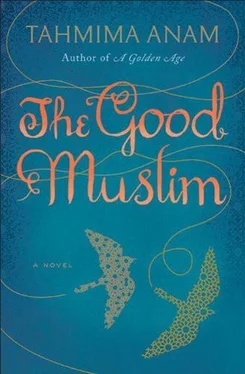He looks like a Chink, Masud had said. Look at his flat nose — did you fuck a Chinese, wife, is that what you did?
He went to the meeting. He told the men. They said they had known something was wrong, known it since that day she and the doctor lady had gone swimming in the pond.
That Chink is not my baby. Lyingcheatingwhoreofawife.
The punishment was one hundred and one lashes.
One, shaped like a question mark, where the whip has curled around her calf.
Raise the sari!
Whore!
At the end, when Maya was the only one still watching, miscounting, thinking it was already one hundred and one when it was only one hundred, she approached her friend, and the whip caught her on its way up, nicked her, the bite of a hungry insect, making her swallow the word she was about to utter. Shesh. Finished . She had spoken too soon. Instead of a word, she was marked by the whip, her hand rushing to the place on her neck where it had touched her and returning with blood. And was that a smile in the man’s eye? The one who was only following orders, protecting the village, the name of the village.
She found Nazia in the hospital. ‘Please go,’ Nazia said. ‘I am tired.’ She was lying on her stomach, legs swaddled. Maya touched her foot, black and hard, and she flinched. ‘Leave me,’ Nazia pleaded.
She wanted to witness the skin closing over Nazia’s wound. She wanted to stay until the marks faded, until they were almost invisible — thin, worm-like tracks that would dance across her legs. She would stand up and they would begin to resist. They would go to the police, they would break up the meetings. But Nazia said no and her black foot said no and Maya realised she would have to leave the wound open, leave the village with her protests still urgent, still angry.
She was wondering where to go next when the telegram arrived. The Hill Tracts, maybe, or the north. She traced her finger around the map of Bangladesh, up the blue arteries, the Jamuna, the Meghna, reading aloud the names of the towns, Mymensingh, Pabna, Kushtia. She was sitting under the jackfruit tree outside her house, munching on a bowl of sour jaam, when the postman stopped and swung a leg over his bicycle. She offered him a piece of fruit, and he declined, looking at his feet. Then he said, ‘Daktar, someone in your family has died.’
It was the only thing she feared. She flung the bowl aside and grabbed the postman’s shoulders, feeling him shrink from the intimacy of the gesture, from the purple stain her fingers would leave on his shirt.
‘Is it my mother? Tell me quick.’ She closed her eyes, as if he was about to hit her.
‘I don’t know, I can’t read English.’
She snatched it from him and tore it open. Silvi. Silvi was dead.
That night, she dreamed of her mother wrapped in a white shroud, her nostrils stuffed with cotton. In the morning she began to pack her things. By dying, Silvi had declared a truce. It was time to go home.
No one came to say goodbye.
The house was changed, but it had survived. And she had made it, two train rides and a ferry across the country, and she was laying her head on her mother’s lap, and there was nothing to do now but remember all the times they had returned to this house, she and her brother, to find everything was the same and not the same, to find their mother waiting, waiting.
The war ended and all the ugly and beautiful things were uglier and more beautiful. The Great Leader Mujib returned from exile and began printing the new currency and renaming all the buildings. Those who had sided with the enemy hid out, afraid of the back-from-war boys who had surrendered their guns but couldn’t stop thinking about revenge. The women wore marigolds in their hair and smelled of coconut oil, and the refugees drifting back from India clutched the cindered husks of their village homes and raised stakes on empty graves.
It was a winter of return, mothers waiting at home, preparing elaborate meals with the leftover war rations, straining their eyes to the road, jumping at the slightest sound. Inevitably, the moment of homecoming did not happen in the way they imagined, with the young boy returning to a fragrant house, rice on the table, everyone washed and smiling. No, it usually happened when she was at the market for a leg of mutton or looking for the lost pair of clothes pegs in the grass, and the boy would appear, dishevelled and with new depths in his eyes, new sorrows etched into him, and when she saw him it would be like birthing him all over again, checking he had all his fingers and toes, wondering if he would survive this new world. And the boy-soldier, quiet, his thoughts turning to ordinary pleasures, the feel of his mother’s cotton sari worn down to its threads, and the shape of her hand on his forehead, and the smell of her, like lemons, puncturing every other sensation.
But Sohail did not return. December ended, then January. Rehana and Maya told stories of his return, of the light and pleasant things they would do. Ice cream and spring chicken. Maybe they would take a trip to the tea gardens, or to Cox’s Bazaar. He had always wanted to see the brown tides of the Bay of Bengal.
When the moment arrived, Maya and Ammoo were at the Women’s Rehabilitation Centre, where they had both signed up as volunteers. That day they returned to find him already home, sitting comfortably in the living room with a newspaper, as if he had been there all along.
He wore a red shirt and a dirty lungi. His face was obscured by the dark grey grizzle of a beard. ‘I’m sorry,’ he said, looking back and forth at them both. ‘I meant to shave.’ They smiled at one another and then Maya embraced him and held on for as long as she could, surprised by the fragrance of earth in his hair.
That night they took the lamp and settled themselves in the garden. Rehana slipped a mosquito coil under Sohail’s chair, and the three of them pushed close to one another, huddling against the February chill.
‘What took you so long?’ she asked. ‘The other boys have been coming in for weeks now.’
Sohail didn’t explain. Smoke from the mosquito coil reached up and caressed them, pungent. He made a gesture with his left hand, which told them he was tired. Maya and Ammoo had been staring at him the whole evening; perhaps he was weary of being looked at.
They fell into silence. All the words seemed too small. The crickets raised their voices, the frogs. Maya thought about the other times they’d sat there. In winter they sometimes put their plates on their laps and ate breakfast and watched the fog curl back. Her father had wanted this garden, this porch that protruded into it. Two months before he died, he had planted a row of tomatoes, bending over the ground himself, sprinkling seeds, folding earth over the cleft. He died before they sprouted, and in the spring, when the plants released their buds of green, it was Ammoo who watered them, shooed away the crows. Years later, when the garden was shortened to make space for the big house, she rescued one or two tomato plants, migrating them to the smaller vegetable patch she had staked out in front of the bungalow, but they didn’t survive the move; their stalks crisped and turned to dust. Maya had found her among them once, holding the bones of the plant, disbelieving.
‘What will we do now, I wonder?’ Sohail asked.
‘Hasn’t she told you?’ Ammoo said. ‘Maya’s going to be a doctor. Look after me in my old age.’
Maya blushed, secretly proud of herself for choosing medicine. A noble way to serve the new country. ‘The university will open soon,’ she said.
‘Back to school for us.’ Sohail appeared unhappy at the prospect of returning to university, of answering yes sir, present sir, in the roll call. ‘What kind of doctor will you be?’ He pointed to himself. ‘Arms and legs? Eyes and ears? Heart?’ He laughed, as though she couldn’t possibly be trusted with anyone’s heart.
Читать дальше












